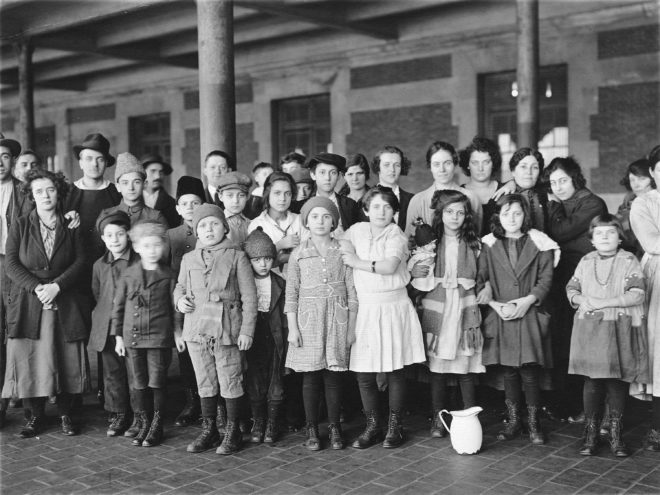December 9, 2018
The Legal Services Staff Association today submitted comments opposing the Trump Administration’s proposed changes to the Immigration and Nationality Act “public charge” provision. Our submission included the following statement:
The Legal Services Staff Association strongly oppose the proposed changes to the public charge rules.
These proposed changes will cause uncertainty, inconsistency, and chaos in the adjudication of immigration benefits and a chilling effect in applying for immigration benefits. This stands in stark contrast to our country’s commitment to family reunification and facilitating the inclusion and integration of immigrants into the United States.
New York City is – proudly – a city of immigrants. Sixty percent of New Yorkers have at least one immigrant member in their household. Thirty-eight percent of New York City’s residents are immigrants.[1] Immigrants contribute both culturally and financially to our world and are an integral part of the fabric of our society. In New York City, 45% of our workforce are immigrant workers, who at last count contributed almost $200 billion per year to the City’s gross domestic product.[2]
Our members include a significant number of attorneys and other advocates who work directly with immigrants and represent immigrants in legal matters. In addition to serving New Yorkers in immigration-related matters, we represent many New Yorkers who happen to be immigrants and who need assistance with unrelated civil legal matters. Some are homeowners who have been the targets of deed theft; others are renters whose landlords are seeking to push them out of their apartments in order to raise the rent; still others have experienced unlawful discrimination or require special education services for their children. This proposed rule would be extremely harmful to the clients we serve.
The proposed rule would dramatically expand the interpretation of public charge to include any individual who is likely to use more than a minimal amount of public assistance, and expands the types of benefits that could be considered in the public charge determination to include programs that support basic human needs, including Medicaid and Supplemental Nutrition Assistance Program (SNAP).
If finalized as written, this rule would facilitate a vision of America that a majority of Americans rejects: a country that excludes people with disabilities and people who may currently earn lower wages but are contributing to their families and communities. The rule would also have a disproportionately negative impact on women and people of color, preventing them from securing lawful immigration status and reuniting with their families.
This proposed rule would deter immigrants from seeking necessary medical care, which raises the long-term costs for tax-payers and has a detrimental effect on the health of the general public. Our advocates who provide legal services to people with HIV have observed that the news of this proposed rule has already resulted in people with HIV being discouraged from accessing antiretroviral treatment so as to not put their permanent residency applications at risk. Because health is a factor to be considered in the proposed rule, this rule could operate as a de facto ban on admission of HIV-positive immigrants to the country. This proposed rule will discourage immigrants with children from accessing SNAP (food stamp) benefits, hurting their children’s health. The proposed rule will also exacerbate homelessness, as it will discourage immigrants from accessing Section 8 and other such housing subsidies and benefits.
With an immigration court backlog that is already above 750,000 cases,[3] the public charge rule would further exacerbate an already record high case volume. Increased evidentiary requirements, heightened scrutiny, and uncertainty as to what standard to apply will delay adjudications, add to the backlog, and result in inconsistent court adjudications. By replacing a time-worn and effective standard with an incoherent framework, immigration attorneys and accredited representatives will find it next to impossible to advise intending immigrants on their eligibility for lawful permanent residence or other immigration benefits. this proposed rule is yet another example of a needlessly restrictive and bureaucratic process imposed by the current administration that has fostered a growing perception among foreign nationals that the U.S. has become an undesirable destination. The proposed rule will reinforce that view, damaging the long-held perception of the U.S. as a country of welcome and chilling international travel and commerce.
If implemented this rule will disproportionately impact low-income immigrants, immigrants with disabilities, persons of color, seniors and other members of our communities. For these individuals this rule would, in effect, deny them a path to come to the US and ultimately gain citizenship. Immigrants, fearful of navigating this complex rule change, will be less likely to file pro se applications or seek adjustment of status. The clients that my members serve would be greatly harmed.
We urge that this proposed rule be rejected.
[1] New York City Mayor’s Office for Economic Opportunity, Mayor’s Office of Immigrant Affairs, and Department of Social Services, Expanding Public Charge Inadmissibility: The Impact on Immigrants, Households, and the City of New York Research Brief (December 2018), available at https://www1.nyc.gov/assets/immigrants/downloads/pdf/research_brief_2018_12_01.pdf
[2] New York City Mayor’s Office of Immigrant Affairs, State of Our Immigrant City (March 2018), available at https://www1.nyc.gov/assets/immigrants/downloads/pdf/moia_annual_report_2018_final.pdf
[3] TRAC Immigration, Immigration Court Backlog Surpasses One Million Cases, Nov. 6, 2018 available at http://trac.syr.edu/immigration/reports/536/#f1.
